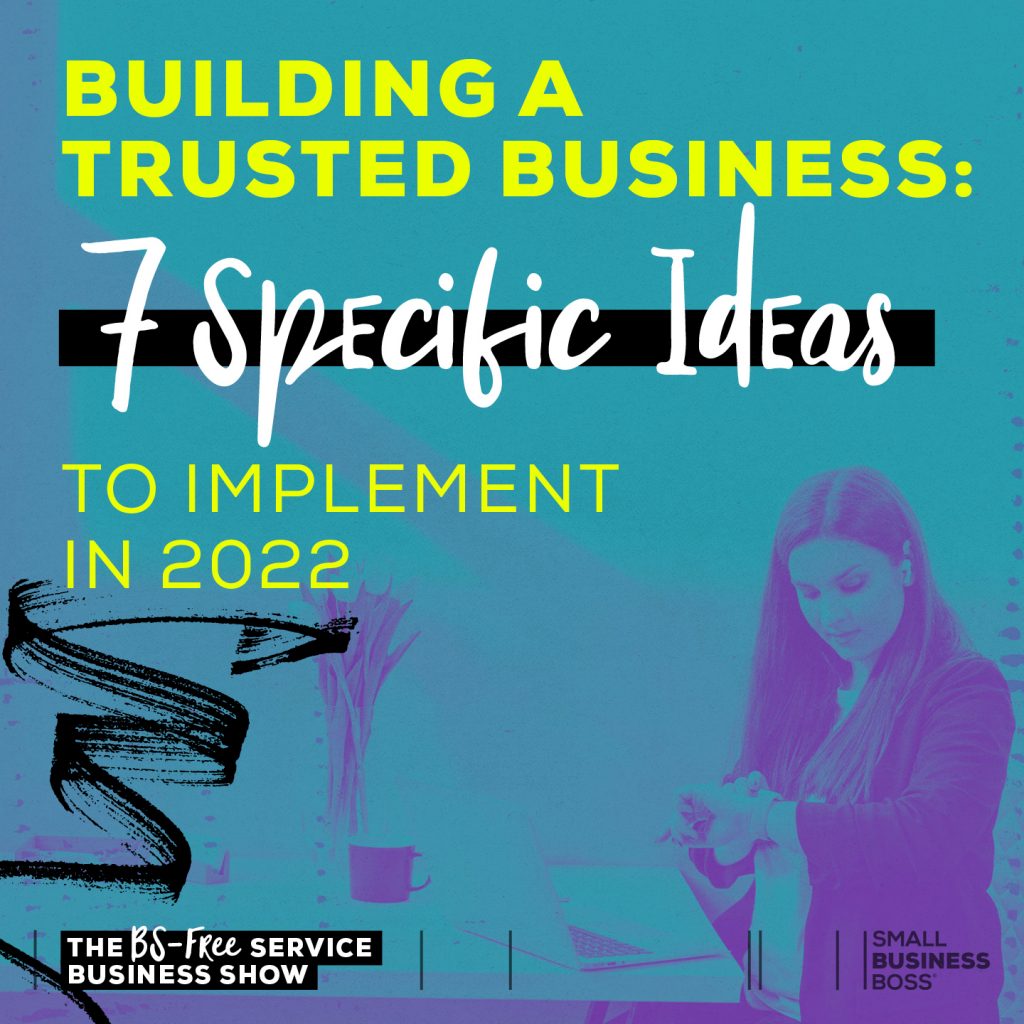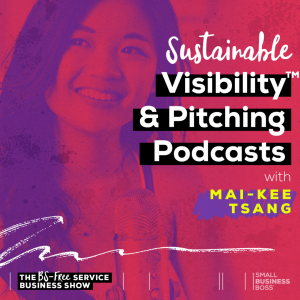
Search the site:
Building a Trusted Business: 7 Specific Ideas to Implement in 2022
Trust is a key component of your ability to market, sell and serve your clients on an ongoing basis. But building trust is harder than it may seem, especially as the status quo of online business teaches tactics and tricks that break trust and lead us down a treacherous path. In this episode, I’m sharing seven specific ideas for you to build a trusted business in 2022.
When you think about trust and your business, you probably think, “of course people trust me”, and you’re not wrong about that. Obviously, if you have a community and clients you have some degree of trust.
But the real question becomes, how can you build more trust and how can you bake trust into everything you do? Focusing on trust in our sales and marketing gives us a way to filter through the trends and tactics to do things that are in alignment with our values.
For most of us, building more trust (and taking care not to break it with people) offers us a way to create a business that’s simple and sustainable.
Why? If you look up the definition of trust in the dictionary, it’s “the firm belief in the reliability, truth, ability or strength of someone or something”.
What we often see as trust in business, isn’t really trust. Like we talked about in the last episode, it’s faux intimacy and games designed to make us think we can trust them.
This isn’t real trust. It’s a trick or an illusion, and that won’t last. That’s why we see celebrity entrepreneurs constantly launching and using treacherous tactics as they need to continuously add new people into the mix. They’re stuck in a cycle of building this fake trust, and then quickly breaking it.
As we run our businesses, focusing on trust in its most correct and literal form offers us a way to forge lasting relationships with our clients and community. To create simplicity and something we can sustain for months and years to come.
With that, let’s look at seven specific ideas you can use to build your trust-based business.
#1. Stay in Your Own Damn Lane
Remember a few minutes ago when I defined trust? It includes a firm belief in the truth, and as we all know, here in online business land, people play fast and loose with the truth.
One of the biggest places this shows up is with people claiming expertise they have no business claiming. This industry has normalized this as celebrity entrepreneurs teach us that it’s okay to teach something we just learned.
My goal isn’t to be a gatekeeper who’s really an expert but rather for each of us to thoughtfully determine what is (and isn’t) in our scope of practice. Our lived experiences matter, but perhaps we shouldn’t be claiming expertise in something we’ve only done once or only have a surface-level knowledge in.
By doing this you’re operating from a place of truth and people will trust you more. There’s a beauty in being able to say you’re not an expert on something that it’s not within your scope of practice.
This builds more trust than anything else, and it’s refreshing in an industry that is full of bullshit experts who do real harm to their clients. You can be different by being a bonafide expert and not trying to be everything to everyone.
#2. Rethink Transparency
Closely related to staying within your scope of practice is the idea that you don’t need to curate any type of persona. You’re not an influencer, and you don’t need to play those games.
In fact, as I shared in the last episode, when you do this, you’re creating faux intimacy, and that doesn’t build lasting trust.
I believe you can be transparent without having to play the celebrity entrepreneur game or put your entire life on display. For your business transparency comes down to ensuring that what you see is what you get.
What that means for your sales and marketing is that you’re crystal clear about what you can do for people, and don’t use bullshit dramatic and traumatic stories to get attention. And while we’re at it, maybe skip the income claim marketing too as while it may seem like it’s a good idea, it actually creates a complete set of expectations.
I don’t know about you, but I didn’t start a business so that my life is on display. I want people to hire me for my experience, skills and the quality of what I do. Not for the income I claim to make, the car I drive or my so-called lifestyle, because make no mistake, this isn’t transparency, it’s just the opposite.
You can build more trust by being transparent in your marketing about the work you do, how you do it, and what you bring to the table. In your sales, you can have a clear sales process that helps people understand what to expect.
That may seem overly simplistic, but that’s what we should be aiming for. The more layers of complexity we add to the mix, the more likely we’re being less transparent. It undermines our community and clients’ trust in us as they start to focus more on the surface and stories, and less on what we really bring to the table.
#3. Clear and Consistent Pricing
With my TrustDNA method, there are five trust cores — truth, transparency, time, results and respect — that help us build trust across our marketing, sales and service. As a practice in our business, pricing is a key place we can build or break trust as it’s impacted by all five of the trust cores.
When you look at your pricing ask yourself how you build trust by creating an experience for your potential clients that makes them feel safe and supported. So many times pricing tactics are used that undermine trust and create dissonance for our potential clients.
Above all else, your pricing should be clear. If you offer something with a fixed price such as a package or program don’t make people jump through hoops to find baseline pricing. I know it’s trendy right now to hide your price so they have to apply, watch a training or book a sales call, but I cannot understate how quickly this breaks trust just as you’re getting close to the sale.
If you offer done-for-you services that require pricing to be customized, take steps to ensure your pricing is easy to understand. Nothing will shake confidence more than getting to the pricing section and ending up totally confused.
Beyond sharing pricing, ensure that any nuances around pricing are clearly articulated so there are no surprises. Money can easily trigger people so the more you can do to ensure they understand payment terms and other conditions in advance the better. This will go a long way to building more trust as people feel safe and secure while deciding whether or not to do business with you.
#4. Acknowledge, Don’t Agitate Pain Points
If you run a business you have to deal with sales copy in some way, shape or form. Even if you’re not using sales pages, you still have proposals or other copy that helps position your offering to your potential customers.
A commonly used copywriting formula in the online business world is PAS, which stands for problem, agitation and solution. The idea being you state the problem, then agitate the reader and finally propose the solution.
This type of copywriting works, but we have to ask at what cost. Do you really want to agitate people about their pain points in order to get them to buy?
From my point of view as an experienced copywriter and content creator is that agitation does very little to create trust. You’re tapping into people’s pain in order to get them to consider your solution when you could simply acknowledge their pain points.
By acknowledging and not agitating pain points, we can approach potential clients from a place of empathy and understanding which goes a long way to creating trust.
No good comes from shaking people up like a snow globe in order to get them to buy from you. Instead, build trust by approaching the sale with respect and reverence for their problems and sharing how you may be able to help. (Doing business this way is a one-way ticket to building a trusted business in the online world where it’s often missing!)
#5. Ask Better Testimonial Questions
In the last episode, I talked about how there’s an absence of credible social proof and how part of that problem is that we only see testimonials that are the top 10% (or sometimes even 1%) of client experiences.
The result is that people don’t have the information they need to make an informed decision, and I’ve heard from so many people that they don’t even bother looking at testimonials.
Testimonials are powerful, but they need to be crafted and shared in a way that enables people to see a wide range of results. Particularly as in online business, the majority of testimonials we see focus on money-specific outcomes.
For your testimonials, look at how you can ask better questions that will help represent both qualitative and quantitative results. Share what it’s like to work with you, and results that people may not expect from working with you.
Using testimonials that don’t reflect a broad range of experiences defeats the point of testimonials entirely. You may temporarily build trust, but it won’t last when people realize the result that were showcased are a “results not typical” scenario.
#6. Create a Trustworthy Timeline
Like it or not, time is a big part of not just how we run our businesses, but in creating trust with our community and clients. The trust factor of time is defined as offering realistic and supportive timeframes within the TrustDNA method.
In the online business realm, there are a lot of common practices that are designed to accelerate the timeline to suit the needs of the seller. This shows up as artificial scarcity and urgency or even overpromising how fast results can realistically happen.
This accelerated timeline impacts trust in that it can override the agency of the potential client in the sales and marketing process, which can ultimately backfire.
That’s why we need to look at our sales and marketing activities and determine how we can create a trustworthy timeline.
First, that timeline for a decision or an engagement or whatever needs adequate time for the potential client to make a fully informed decision. Next, it should communicate that timeline in a way that helps build trust and prioritizes the self-trust of your potential client.
In practical terms, let’s say you’re selling a productized service and you only have two spots a month. First, you can be clear that there are only two spots, and that if they want to book on X day, you likely need to know by Y. You can create that timeline in a way that gives them time to consider and not rush to a decision, but so that they understand there are only two spots available.
Next, you can communicate in a way that removes pressure from making the decision. Once they have factual information, you can leave it to them to decide based on that without you forcing a decision.
Time is a hidden superpower when it comes to building trust, so don’t underestimate its value.
#7. Building Business Boundaries
Finally, to wrap it all up, I want to talk about boundaries. Many factors impact our ability to set and hold boundaries from trauma to privileges to social norms, so as we talk about boundaries, I want to acknowledge that there’s a lot of nuance in this.
Boundaries have a critical role to play in building trust in our relationships with potential and current clients. However, so many times we want to be of service, so we end up mistaking being of service with being subservient.
Trust is the foundation of all relationships, and for us to have healthy relationships we need to have boundaries in place. That’s a huge part of building a trusted business.
Think of your boundaries as rules of engagement around your emotions, energy, time, physical or even financial needs.
Without boundaries in place, our relationships can be rocky which degrades trust over time. When you consider this in the context of your business, you likely already know where you need to work on your boundaries.
A common example I can share from personal experience is feeling frustrated or disrespected by a client so I start to not trust them. They’re pushing my boundaries around my work hours or availability, and it starts to shift the relationship.
That’s where I need to consider if they don’t know about the boundary or if they don’t care. If they don’t know, I need to outline that boundary in order to get the relationship back on track so I can trust them again. If they don’t care, that’s another issue entirely that’s tied to respect, and it may mean trust has been broken to such a point it can’t be rebuilt.
Speaking of respect, next episode we’ll be diving into the role of respect in building a trusted client experience.
As you think about your boundaries, notice where you’re feeling like you can’t trust someone as that’s always a surefire sign boundaries need work. I’m sure you can think of a few examples right now off the top of your head where you can build better boundaries in your business to help create more trust.
Building a Trusted Business: Wehre Will You Start?
Having a business that people can trust (and clients that trust you) is a worthy goal for every one of us, but it will take effort and work. When you think back to what we’ve talked about today, consider which one of these is a simple, but needed area of focus for you as we start off 2022.
Finally, a reminder, Building a trusted business takes ongoing, sustained work so you’re not going to blow through all 7 of these ideas right away. But I’m willing to bet you can focus on a few of them over the course of this year to bake a little more trust into your business practices and ultimately your relationships.


I’m Maggie Patterson (she/her), and services businesses are my business.
I have 20+ years of experience with client services, am a consultant for agency owners, creatives, and consultants, and vocal advocate for humane business practices rooted in empathy, respect, and trust.
Read or Listen to the Latest
For Solo Business Owners

Growing a solo service business is tough.
It’s even harder when you’re bombarded with BS advice that steers you away from your values and why you started your business in the first place.
This is the podcast for solo creatives and consultants who want to remain as a team of one and have zero interest in the hustle and grind of typical business teachings.
Subscribe now and never miss an episode.
For Micro Agency Owners
Most podcasts for agency owners obsess over revenue growth as the ultimate success metric.

But here’s the truth: not everyone wants to make millions. Your goal might be to build a sustainable business that lets you have a life and doesn’t run you into the ground.
Join me as I spill my shameless confessions and share everything I’ve learned about building a micro agency that skips the BS of tired and typical agency teachings.
Follow Now on All Major Podcast Platforms








